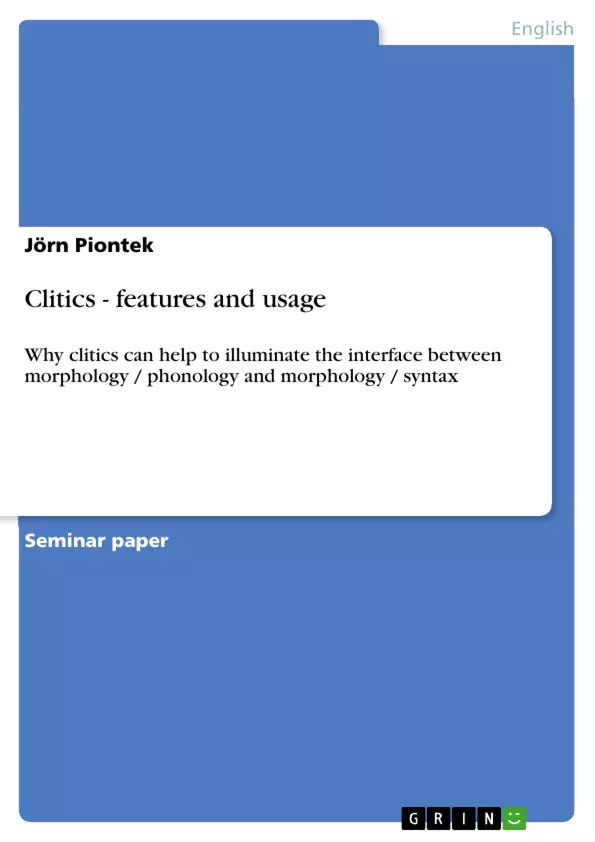Diese Hausarbeit befasst sich mit Klitika und ist auf Englisch verfasst. Startpunkt der Betrachtung sind die Englischen Wortformen "we're" und "won't", die kurz analysiert werden. Im Folgenden geht es um Klitika allgemein und deren Eigenschaften. Kernpunkt der Arbeit ist dann die Frage, ob die Annahme einer weiteren Klasse von gebundenen Morphemen (also Klitika) gerechtfertigt ist und ob jede Sprache solche Morpheme hat, die aufgrund ihres Status zwischen unabhängigen Wörtern und klaren Affixen gewisse Probleme aufwerfen. Im Rest der Arbeit wird noch darauf hingewiesen, ob und inwiefern die Betrachtung bei Klitika bei der Analyse der Interfaces zwischen Morphologie und Syntax bzw. Morphologie und Phonologie hilfreich ist und warum Klitika häufig auch post-lexikalische Affixe genannt werden.
Inhaltsverzeichnis (Table of Contents)
- Analyze the forms we're and won't. Describe the difficulties of morphological analysis.
- Name and specify the features of clitics.
- Do you consider the assumption of another class of bound morphemes justified?
- Comment on the statement by Zwicky (1): "Most languages - very possibly, all except for the most rigidly isolating type - have morphemes that present analytic difficulties because they are neither clearly independent words nor clearly affixes."
- Explain why clitics can help to illuminate the interface between morphology - phonology and morphology - syntax.
- Why are clitics also called "post lexical affixes"?
Zielsetzung und Themenschwerpunkte (Objectives and Key Themes)
The paper aims to analyze the forms "we're" and "won't" and delve into the complexities of morphological analysis. It explores the characteristics of clitics and examines the justification for considering an additional class of bound morphemes. The paper also investigates the relationship between clitics, morphology, phonology, and syntax.
- Morphological Analysis of English Forms
- Characteristics and Features of Clitics
- The Nature of Bound Morphemes
- Interface between Morphology, Phonology, and Syntax
- The Role of Clitics in Linguistic Analysis
Zusammenfassung der Kapitel (Chapter Summaries)
- The first chapter examines the forms "we're" and "won't" and discusses the challenges of determining their morphological structure. It analyzes the syntactic and phonological properties of these forms, highlighting the concept of bound morphemes and their relationship to inflectional and derivational morphemes.
- The second chapter delves into the definition and features of clitics. It explores their phonological and syntactic behavior, contrasting them with inflectional affixes and discussing various types of clitics, including proclitics, enclitics, and endoclitics.
- The third chapter focuses on the justification for assuming a distinct class of bound morphemes beyond clitics and inflectional affixes. It examines the criteria proposed by Zwicky and Pullum for differentiating clitics from inflectional affixes, considering the degree of selection, morphophonological idiosyncrasies, and syntactic behavior.
Schlüsselwörter (Keywords)
The key concepts explored in the paper include: morphological analysis, clitics, bound morphemes, inflectional affixes, derivational morphemes, phonology, syntax, proclitics, enclitics, endoclitics, and the interface between morphology, phonology, and syntax.
Frequently Asked Questions
What are clitics in linguistics?
Clitics are morphemes that have the syntactic characteristics of a word but are phonologically dependent on another word (a host), such as " 're " in "we're".
How do "we're" and "won't" differ in morphological analysis?
The paper analyzes these forms to show the difficulty of distinguishing between independent words and bound morphemes (affixes).
Why are clitics called "post-lexical affixes"?
They are often called post-lexical because they attach to their host after the main word formation (lexicon) has occurred, often during the syntactic arrangement.
What is the interface between morphology and syntax?
Clitics help illuminate this interface because they behave like words syntactically but like parts of words (affixes) phonologically.
Do all languages have clitics?
According to Zwicky, most languages (except perhaps the most rigidly isolating types) have morphemes that present these analytic difficulties.
- Quote paper
- Jörn Piontek (Author), 2009, Clitics - features and usage, Munich, GRIN Verlag, https://www.grin.com/document/168527



